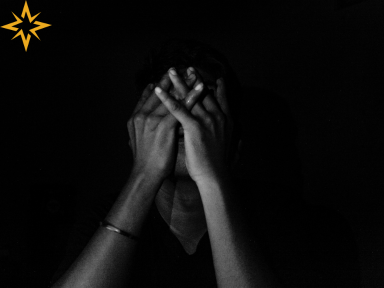Depression in EHC
By Sarah and Michael C.
Depression by MUHAMAD ALIP FABIO MANDAKA from Alipdesign Created in Canva
August 15th was the day when a fundamental change occurred in Afghanistan. A certain class of people conceives it as a day of independence, whereas another explains it as a day of destruction. To make things clearer, it is the point of view that matters. And it is the point of view of a specific person or group of people that will be investigated in this piece of investigative journalism. After the drastic change that shook a country to its core, many incidents and experiences supervened. The ordeal of an individual will be shared in this article.
Habibullah Habib, a former English lecturer at Kabul University, and his family were evacuated on October 8, 2022, from Afghanistan to EHC (Emirates Humanitarian City) in Abu Dhabi, United Arab Emirates. It has been almost a year since their evacuation, yet their destiny is quite unknown. Emirates Humanitarian City is a camp allocated for refugees from war-torn countries around the world. It serves as a lily pad for refugees to be evacuated to their final destinations. Ever since the fall of Afghanistan, EHC has been hosting Afghan refugees brought by military and charter flights.
National and International aid provide shelter and corporeal needs for the refugees; still, the residents are anxious about their amorphous future. In response to my question, “How do you analyze the camp’s situation?” Habibullah delineates it as following, “Compared to the living condition of the Afghan refugees in other countries, the condition is much better in this camp. This is not a refugee camp; it is called Emirates Humanitarian City. It is mostly like a guest house. We receive sufficient food, water, and basic healthcare. The security in this camp is maintained. But still, it is a camp, and the refugees are facing lots of restrictions and they cannot go outside the camp unless there is an emergency.”
Critical issues like suicide attempts and other jeopardizing incidents have resulted from the refugees’ unclarity of destiny. As confirmed by Habib, the monotonous lifestyle and state of purposelessness have caused people to slip into despondency. He adds that the condition is more unfavorable to people who, like him, had always been working. He also shares his personal experience; he says that this condition has affected him terribly both physically and mentally. He asserts that the circumstances are not under his control, so he comforts himself by teaching English to Afghan refugees and being optimistic that this misery will end someday.
These uncertainties have caused a lot of tension among the refugees, resulting in mental and physical illnesses, such as depression. Depression is a more advanced and exacerbated version of stress. According to the American PSYCHIATRIC Association, depression is a serious medical illness that negatively affects the perceptions and reactions of an individual. Depression is when grief and bereavement last for a long amount of time. Though depression may not seem critical at first, it can result in lethal incidents. As written in an article on the Healthline website, depression can cause physical sicknesses too. The brain acts like the CPU of a human being; when it is not operating well, it can cause a malfunctioning fall in other parts of the body. Our brains even control the flow of hormones in our bodies. Habib says, “This unfavorable condition has caused the people depression. Most of the people here suffer from anxiety and mental and physical sicknesses.”
In conclusion, depression is an illness that must be taken seriously since it can result in dangerous incidents. Therefore, practical steps should be taken against depression. In the refugees’ case, depression can cause various illnesses which are affecting them badly. This issue is the main problem that has caused diseases and suicide attacks in EHC. The solution to this, from the refugees’ point of view, is evacuating them from this camp and resettling them to their destination.
Columns: 👤NSA People 🔎Informational
About the Author:
Sarah is a NorthStar student in the 10th grade. Sarah and her family lived in the capital of Afghanistan, Kabul city. After The Taliban took over her country, they searched for ways to leave the country. Finally, they were evacuated to Emirates Humanitarian City on October 8, 2021. Contrary to what they predicted at first, they remained in EHC for almost one year. That one year was the gloomiest and most dreadful year of Sarah’s whole life. Thanks be to God, their case got approved and they arrived in the US on October 7, 2022. Sarah currently lives in North Carolina. Sarah wrote this article as an English assignment for NorthStar academy. Please pray for people around the world who are undergoing difficult circumstances like Sarah’s.
Michael C. currently lives in North Carolina with three siblings and mom and dad. He has been at NorthStar for three years and has recently started writing for the Navigator. He enjoys running, reading, and geeking out about Lord of the Rings.

